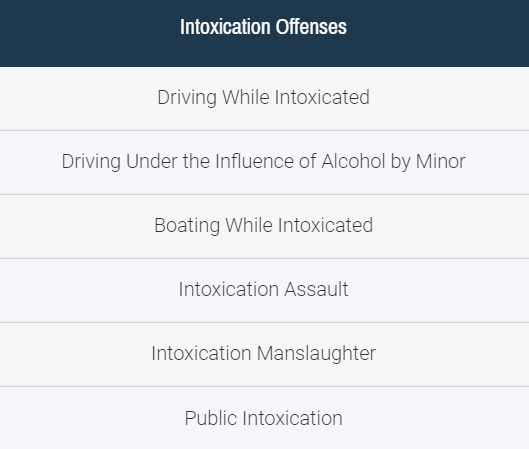Intoxication Offenses

Intoxication

Relevant Statute:
Texas Penal Code § 49.01 — Definition of “Intoxicated”
Driving While Intoxicated
Under Texas drunk driving laws, law enforcement can arrest you for Driving While Intoxicated (DWI) if you operate a motor vehicle in a public place while intoxicated. You can also be charged with Driving While Intoxicated with Child Passenger if you operate a motor vehicle that is occupied by a child under the age of 15 while intoxicated.
Driving While Intoxicated is a Class B misdemeanor, unless your BAC was 0.15 or more at the time the analysis was performed, in which case the offense is a Class A misdemeanor. Driving While Intoxicated with Child Passenger is a state jail felony.
DWI cases can be challenging, but, as a Lubbock DWI lawyer, I use a wide range of DWI defense methods to help you avoid a DWI conviction. A DWI arrest does not have to ruin your life. Contact me today for a free case evaluation.
Relevant Statutes:
Texas Penal Code § 32.34 — Definition of “Motor Vehicle”
Texas Penal Code § 49.04 — Driving While Intoxicated
Texas Penal Code § 49.045 — Driving While Intoxicated with Child Passenger
Boating While Intoxicated

BWI charges are considered just as serious as DWI in Texas and the penalties for BWI cases are the same as the penalties for DWI.
Relevant Statutes:
Texas Penal Code § 49.01 — Definition of “Watercraft”
Texas Penal Code § 49.06 — Boating While Intoxicated
Driving or Operating Watercraft Under the Influence of Alcohol by Minor
Texas is a zero tolerance state when it comes to Driving or Operating Watercraft Under the Influence of Alcohol by Minor (DUI), which is a Class C misdemeanor offense. This means that minors cannot drive or operate a boat with ANY detectable amount of alcohol in their systems, and police officers can arrest minors even if they are not intoxicated.
It’s important to note that in this statute, the word “minor” doesn’t just refer to children who are under the age of 18, it also includes anyone who is under the age of 21, which is the legal drinking age. So, for DUI charges, 18-year-olds, 19-year-olds, and 20-year-olds will also be considered minors by law enforcement officers.
Relevant Statute:
Texas Alcoholic Beverage Code § 106.041 — Driving or Operating Watercraft Under the Influence of Alcohol by Minor
Intoxication Assault
You can be charged with Intoxication Assault, which is generally third degree felony, if you accidentally cause “serious bodily injury to another” while committing DWI or BWI, or certain other intoxication-related crimes.
Texas law defines “serious bodily injury” as an injury that:

Relevant Statute:
Texas Penal Code § 49.07 — Intoxication Assault
Intoxication Manslaughter
In Texas, you are guilty of Intoxication Manslaughter if you commit DWI, BWI, or certain other intoxication-related offenses, and cause the death of another person by accident. Intoxication
Manslaughter is usually a second degree felony.
Relevant Statute:
Texas Penal Code § 49.08 — Intoxication Manslaughter
Public Intoxication
Even if you don’t drive or hurt anyone, you can be arrested for Public Intoxication if you appear in a public place while intoxicated by drugs or alcohol to the degree that you may be a danger to yourself or others. For people who are over the legal drinking age, Public Intoxication is a Class C misdemeanor.
Relevant Statute:
Texas Penal Code § 49.02 — Public Intoxication


